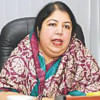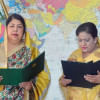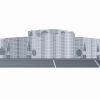Cultivating a politically-diverse generation of leaders

The absence of healthy democratic exercises often results in society tending to sideline endemic structural concerns within political parties and governance structures. The case is no different in Bangladesh. The focus of analysis tends to be on the leadership due to the top-down nature of how the two major parties have established themselves as dominant electoral machines over the past four decades. Yet, it is equally important to perhaps take a deeper look at the demographic composition of those holding top political posts across these organisations. At the end of the day, politicians and parliamentary representatives frame public policies, which shape the lives of the future generation. And without understanding and critiquing what perspectives they represent, it is impossible to cultivate a state-society relationship that moulds inclusive, pro-people and needs-based policymaking.
Let's dive into some numbers for context. The presidium body of the Awami League is the highest policymaking body of the ruling party; merely three of the 17 active presidium members are aged under 70 years. On the other side of the aisle, the Standing Committee of the Bangladesh Nationalist Party (BNP) – which apparently acts as the de facto collective leadership-based decision-making body in the absence of the ailing and judicially convicted party chief Khaleda Zia – does not have a single member who is aged under 70. Therefore the most prominent policymakers of the two major political parties comprise senior citizens representing the war-time generation. And while our debt to them remains absolute and timeless, how can we solely expect a generation that represents a minority in the context of a younger demographic, which is characteristic of the majority population in Bangladesh, to respond to the wills and wishes of this generation?
Every major demographic indicator suggests that Bangladesh has an extremely young population. About 18.56 percent of its citizens fall in the 15-24 age group. A whopping 40.72 percent of the population fall in the 25-54 age group. Whereas a mere 6.82 percent of the population is aged 65 and above. And yet, it is this specific demographic of senior citizens that is representative of the status quo when it comes to policymaking and political leadership in the country. The average age of the national parliament elected in 2018 is 59.48 years, as per data provided by the Inter-Parliamentary Union (IPU), with only 10.57 percent of MPs aged 45 and under. As harsh as this may sound, political veterans of the yesteryears continue having undisputed authority in governing and framing the future of the nation.

If a single generation of like-minded individuals cultivate and narrate the future of an entire nation, then we will remain at an impasse; the lack of demographic diversity is deeply concerning. However, the one core foundational aptitude of the older generation of political leaders who continue being in leadership roles today stems from their experience and expertise in grassroots politics. From the 1970s to the 2000s, this particular segment of political leadership who stood by Sheikh Hasina and Khaleda Zia developed themselves into astute and capable political actors based on their experience in student politics and activism-based undertakings. Nevertheless, the politics of the 21st century is widely different; more policy and less politics is perhaps the demand of time. More so than street movements or traditional picketing, politics has shifted towards outreach across social media and a general need to portray party politics as vehicles of transformational policy changes, rather than being mere partisan ideological forces. Therefore, with an ageing political leadership and a growing youth population, this decade may very well represent a crucial and critical transition point in Bangladesh's history – the passing of the political baton from the war-time generation of leaders to those whose focus must be on peace, unity, accountability, democracy, social development, and human rights.
This brings with it a unique opportunity to induct fresher and intellectually competent faces from a diverse range of professions and grassroots systems into the political landscape. But when it comes to diversity of professional backgrounds in politics, the data is even more concerning. The current parliament, for example, boasts an enormous 61 percent of businesspersons as elected MPs. The increasing dominance of business elites indicates the power of wealth in defining political decisions in the country, with over 82 percent of MPs registered formally as kotipoti (millionaires), according to SHUJAN. Therefore, while there is an immediate need to bring forth the younger generation into positions of political influence and authority – particularly within the internal ranks of the two major parties – it is equally important for individuals outside the purview of entrepreneurship to be provided with the opportunity to be active political actors.
The older generation of political leaders were traditionally backed by business elites. From general elections to party funding mechanisms, there is no doubt that money has historically played a pivotal role in ensuring the sustenance of the two-party system in Bangladesh. However, today we are witnessing the direct integration of entrepreneurial interests into the political landscape and parliamentary politics. And the motive of enhancing financial capital, while sidelining concerns regarding conflicts of interests by using politics as an uninterrupted money-making vehicle, could not be clearer to the naked eye.
In summary, demographic indicators and political data suggest that Bangladesh is at a unique crossroads when it comes to a political system developed under the leadership of the war-time generation. On the one hand, our two major parties and parliament fail to represent the modern demography of Bangladesh; add to this the business elites who exclusively dominate the political system. On the other hand, given that the sun is setting on the careers of the war-time generation of political leaders, the nation has the opportunity to induct a new generation of fresher, competent and more relatable leaders into the political landscape. The principal challenge of institutionalising democratic exercises and the practice of free, fair, credible, and inclusive elections remains absolute as well.
Therefore, keeping these concerns in mind, it is time to ensure demographic and occupational diversity across our political system. And this can only be done with the active decision of the veteran generation to slowly but surely start grooming and handing the reins to a new generation of competent political leaders.
Mir Aftabuddin Ahmed is a banking professional based in Toronto, Canada.

 For all latest news, follow The Daily Star's Google News channel.
For all latest news, follow The Daily Star's Google News channel. 








Comments